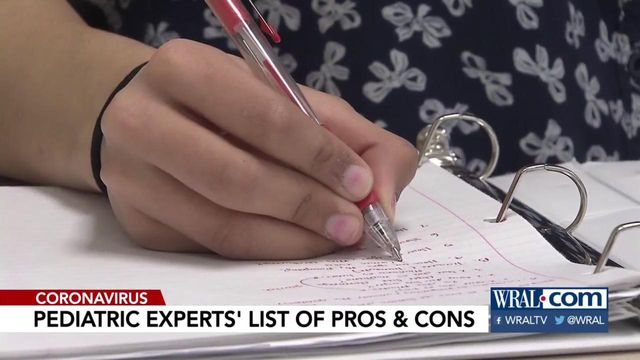Experts: School attendance mandate could cause virus spike
Pediatric experts at Duke University say a state law requiring students to attend school in person for the first five days of the school year could cause a spike in cases of coronavirus.
Posted — UpdatedThe experts spoke on a panel Tuesday about how reopening schools could affect the health of students, families, teachers and staff.
They agreed that reopening school for in-person classes is a trade-off for children. It will increase their risk for infection, but it also has social and developmental benefits, especially for younger students. It also will help to make up the academic losses of last spring, especially for lower-income students, who research shows lost more ground than their higher-income peers.
Lisa Gennetian, the Pritzker Associate Professor of Early Learning Policy Studies, said schools also connect many students to food and social services. With poverty and homelessness expected to rise over the next months, they could play a critical role in providing at-risk students with a safe, stable place, she said.
"It’s very, very hard for them to catch up," Gennetian said. "I think part of the trade-offs of the public health concern should also be balanced with what’s happening with the economic environment in all these local communities and not to forget that schools serve multiple functions."
Dr. Charlene Wong, an associate professor of pediatrics who works with teens, said the stress of the pandemic and the economic uncertainty has led to increases in depression and anxiety, especially among older students.
"I’ve had patients describe it to me as being stuck in an anxiety attack," Wong said, "particularly for our older youth. They are very aware of the economic stress their parents, their families are experiencing."
However, returning to the classroom comes with stress, too. Dr. Ibukun Akinboyo, a specialist in pediatric infection, said schools have been the source of clusters in some countries, notably Israel.
Akinboyo said the U.S. is the first country in the world to try to reopen schools while community spread of the virus is rising fast.
"The only way to open schools safely would be to have a comprehensive approach to reducing COVID-19 transmission in our community, and that requires everyone," she said.
Reopening also comes with risks to teachers and staff who work with students in schools. Panelists said policymakers should ensure that all educational staff have access to health insurance and protective gear.
Whether a student should return in person or study online, they agreed, should be left up to the family. It depends on a variety of factors, including the child's age, developmental needs, suitableness of the home setting, reliable internet access and child care availability.
"It’s also about who else is in the household? Do you have a high-risk child? Who are the adults living in the household?" Wong asked. "What’s the risk factor? We’re never going to be able to bring that to zero."
"Certainly, that could cause a spike," said Wong. "There should never be a mandate, particularly at this point in the pandemic, that children must attend. There should always be a remote learning option."
The mandate "will fail," agreed Gennetian. "It will have negative repercussions."
Gov. Roy Cooper said the state Attorney General's Office has determined that statewide guidelines issued Tuesday that allow schools to combine in-person and remote instruction comply with the law.
In the meantime, the Duke experts advised families sending children back to school in person to put preparation in place for unexpected two-week quarantines if outbreaks happen. Few child-care facilities will accept a child who's known to have been exposed to coronavirus, so family and community support networks will be needed.
"We’re probably not going to get it all right out of the gate. This is the first time we’ve ever tried to do something like this at this scale across the country," Wong said. "So, it’ll be really important for us to monitor what’s happening and then improve how we’re doing to make sure we’re protecting the health and well-being of children, families and, importantly, the staff."
• Credits
Copyright 2024 by Capitol Broadcasting Company. All rights reserved. This material may not be published, broadcast, rewritten or redistributed.






